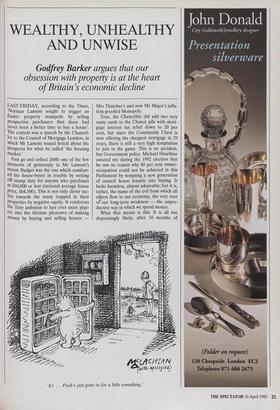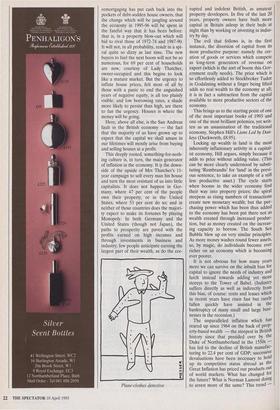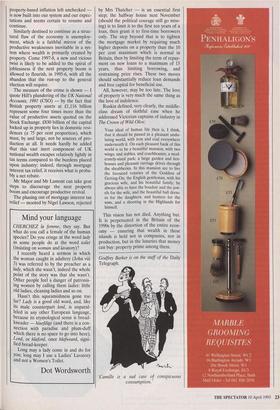WEALTHY, UNHEALTHY AND UNWISE
Godfrey Barker argues that our
obsession with property is at the heart of Britain's economic decline
LAST FRIDAY, according to the Times, 'Norman Lamont sought to trigger an Easter property stampede by telling prospective purchasers that there had never been a better time to buy a house'. The context was a speech by the Chancel- lor to the Council of Mortgage Lenders, in Which Mr Lamont waxed lyrical about the Prospects for what he called 'the housing market.'
Pass go and collect £600: one of the few moments of generosity in Mr Lamont's recent Budget was the one which comfort- ed the house-buyer in trouble by writing off stamp duty for anyone who purchases at £60,000 or less (national average house Price, £64,500). This is not only clever tac- tics towards the many trapped in their Properties by negative equity. It reinforces the Tory ambition to lure ever more play- ers into the lifetime pleasures of making money by buying and selling houses — Mrs Thatcher's and now Mr Major's infla- tion-proofed Monopoly.
True, the Chancellor did add two very nasty cards to the Chance pile with mort- gage interest tax relief down to 20 per cent, but since the Community Chest is now offering the cheapest mortgage in 29 years, there is still a very high temptation to join in the game. This is no accident, but Government policy. Michael Heseltine assured me during the 1992 election that he saw no reason why 80 per cent owner- occupation could not be achieved in this Parliament by tempting a new generation of council house tenants into buying. It looks harmless, almost admirable; but it is, rather, the name of the evil from which all others flow in our economy, the very root or our long-term weakness — the unpro- ductive way in which we spend money.
What that means is this. It is all too depressingly likely, after 18 months of
'Er. . . Pooh's just gone in for a little something.' remortgaging has put cash back into the pockets of debt-sodden house owners, that the change which will be jangling around the economy in 1995-96 will be spent in the fateful way that it has been before: that is, in a property blow-out which will bid to rival those of 1972-74 and 1987-90. It will not, in all probability, result in a spi- ral quite so dizzy as last time. The new buyers to fuel the next boom will not be so numerous, for 69 per cent of households are now, courtesy of Lady Thatcher, owner-occupied and this begins to look like a mature market. But the urgency to inflate house prices, felt most of all by those with a panic to end the anguished years of negative equity, is all too plainly visible; and low borrowing rates, a shade more likely to persist than high, are there to fan the urgency. Houses is where the money will be going.
Here, above all else, is the San Andreas fault in the British economy — the fact that the majority of us have grown up to expect that the capital we shall amass in our lifetimes will mostly arise from buying and selling houses at a profit.
This deeply rooted, something-for-noth- ing culture is, in turn, the main generator of inflation in the economy. It is the down- side of the upside of Mrs Thatcher's 11- year campaign to sell every man his house and turn the most resistant of us into little capitalists. It does not happen in Ger- many, where 47 per cent of the people own their property, or in the United States, where 53 per cent do so; and in neither of those countries does the majori- ty expect to make its fortunes by playing Monopoly. In both Germany and the United States (though not Japan), the paths to prosperity are paved with the profits earned on high incomes and through investments in business and industry; few people anticipate earning the largest part of their wealth, as do the cor- Plane-clothes detective rupted and indolent British, as amateur property developers. In five of the last 20 years, property owners have built more capital in Britain asleep in their beds at night than by working or investing in indus- try by day.
The evil that follows is, in the first instance, the diversion of capital from its most productive purpose: namely the cre- ation of goods or services which compete as long-term generators of revenue on export (which is the sort of boom this Gov- ernment really needs). The price which is so effortlessly added to Stockbroker Tudor in Godalming without a finger being lifted adds no real wealth to the economy at all; it is in fact a subtraction from the capital available to more productive sectors of the economy.
This brings us to the starting point of one of the most important books of 1993 and one of the most brilliant polemics, yet writ- ten as an assassination of the traditional economy, Stephen Hill's Lions Led by Don- keys (Duckworth, £8.95).
Locking up wealth in land is the most inherently inflationary activity in a capital- ist economy, Hill argues, simply because it adds to price without adding value. (This can be more clearly understood by substi- tuting Rembrandts' for 'land' in the previ- ous sentence, to take an example of a still less productive asset.) The cycle starts when booms in the wider economy find their way into property prices; the spiral steepens as rising numbers of transactions create new monetary wealth; but the pur- chasing power which has been thus added to the economy has been put there not as wealth created through increased produc- tion, but as money created on the increas- ing capacity to borrow. The South Sea Bubble blew up on very similar principles. As more money washes round fewer assets, so, by magic, do individuals become ever richer on an economy which is becoming ever poorer. It is not obvious for how many years more we can survive on the inbuilt bias for capital to ignore the needs of industry and lurch instead towards adding yet more storeys to the Tower of Babel. (Industry suffers directly as well as indirectly from this bias, of course: rents and leases which in recent years have risen fast but rarely fallen quickly have assisted in the bankruptcy of many small and large bust- nesses in the recession.) The unparalleled inflation which has reared up since 1964 on the back of prop- erty-based wealth — the steepest in British history since that presided over by the Duke of Northumberland in the 1550s — has led to the decline of British manufac- turing to 22.4 per cent of GDP; successive devaluations have been necessary to hold up its competitive status abroad as the Great Inflation has priced our products out of world markets. What has changed for the future? What is Norman Lamont doing to arrest more of the same? This trend —
property-based inflation left unchecked — is now built into our system and our expec- tations and seems certain to resume and continue.
Similarly destined to continue as a struc- tural flaw of the economy is unemploy- ment, which is a faithful mirror of the productive weaknesses inevitable in a sys- tem where wealth is primarily created by property. Come 1997-8, a new and vicious twist is likely to be added to the spiral of joblessness if the next property boom is allowed to flourish, in 1995-6, with all the abandon that the run-up to the general election will require.
The measure of the crime is shown — I quote Hill's plundering of the UK National Accounts, 1991 (CSO) — by the fact that British property assets at £1,116 billion represent some four times more than the value of productive assets quoted on the Stock Exchange. £830 billion of the capital locked up in property lies in domestic resi- dences (a 75 per cent proportion), which must, by and large, not be sources of pro- duction at all. It needs hardly be added that this vast inert component of UK national wealth escapes relatively lightly in tax terms compared to the burdens placed Upon industry; indeed, through mortgage interest tax relief, it receives what is proba- bly a net rebate.
Mr Major and Mr Lamont can take geat steps to discourage the next property boom and encourage productive revival.
The phasing out of mortgage interest tax relief — mooted by Nigel Lawson, rejected
by Mrs Thatcher — is an essential first step; the halfway house next November (should the political courage still go miss- ing) is to limit it to the first ten years of a loan, then grant it to first-time borrowers only. The step beyond that is to tighten the mortgage market by requiring much higher deposits on a property than the 10 per cent maximum which is normal in Britain, then by limiting the term of repay- ment on new loans to a maximum of 15 years, thus limiting borrowing, and restraining price rises. These two moves should substantially reduce loan demands and free capital for beneficial use.
All, however, may be too late. The love of property is very much the same thing as the love of indolence.
Ruskin defined, very clearly, the middle- class dream of slothful ease when he addressed Victorian captains of industry in The Crown of Wild Olive:
Your ideal of human life then is, I think, that it should be passed in a pleasant undu- lating world, with iron and coal everywhere underneath it. On each pleasant bank of this world is to be a beautiful mansion, with two wings; and stables, and coachhouses; a mod- erately-sized park; a large garden and hot- houses and pleasant carriage drives through the shrubberies. In this mansion are to live the favoured votaries of the Goddess of Getting-On; the English gentleman, with his gracious wife, and his beautiful family; he always able to have the boudoir and the jew- els for the wife, and the beautiful ball dress- es for the daughters, and hunters for the sons, and a shooting in the Highlands for himself.
This vision has not died. Anything but. It is perpetuated in the Britain of the 1990s by the distortion of the entire econ- omy — ensuring that wealth in these islands is held not in companies, nor in production, but in the luxuries that money can buy: property prime among them.
Godfrey Barker is on the staff of the Daily Telegraph.
'Camille is a sad case of conspicuous consumption.'




























































 Previous page
Previous page